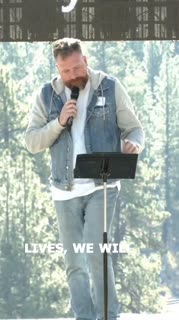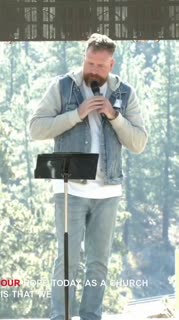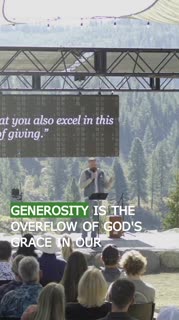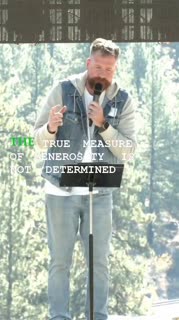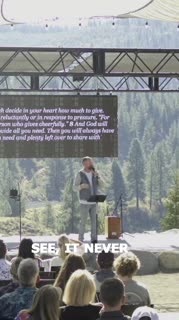Embracing Generosity: A Spiritual Journey of Giving
Devotional
Sermon Summary
Bible Study Guide
Sermon Clips
1) "At the end of our lives, we will undoubtedly, regret the mistakes we've made. This is true. But research shows that we will regret the missed opportunities even more. One study suggests that we will regret opportunities missed by a factor of five, which is 84% more than the things we've done wrong. Let me say it this way. The mistakes you've made, you will regret at the end of your life. But the opportunities that you have passed by, that you have not said yes to, that you have missed out on, you will look back, when you were near death, and you will say, I missed that 84% more. I feel worse about that than the things that I actually did wrong." [05:28] (40 seconds)
2) "Our hope today as a church is that we would live a life of generosity. That when you look back over how you've lived so far and how you will have lived, you will say, I lived a generous life. One that was kind, one that was giving, one that was selfless, one that invested in things that were important in this world, that were more, that were beyond me, and the personal blessing that I could receive from them." [06:24] (27 seconds)
3) "See, Christians live a life of faith. And faithfulness is not maintaining what is. When faith is involved, when it enters into the room, when it's part of the equation, simply maintaining is just not an option. See, you can do nothing wrong and still do nothing right. Let me say that again. You can do nothing wrong and still do nothing right. Goodness is not the absence of badness. That was what a glass half-empty gospel would be. We were not created to play it safe, to simply avoid bad things. The Bible says that we were created to be conquerors, risk takers." [08:26] (41 seconds)
4) "What if how we spend our money, what we give our money to, what we buy is not mathematical. What if it's actually moral? What if there is a moral line that cannot ever be separated by what we buy, by what we give to, by what we spend our time, our finances, our resources, our money to? What if it's actually moral? See, if we can maintain the status quo and there's no actual cost, we may be thinking, well, that's a safe life. That's a good life. That's an even keeled life." [07:29] (37 seconds)
5) "Generosity is the overflow of God's grace in our lives. Let me say it again. Generosity is the overflow of God's grace in our lives. And what does that mean? We begin with God, and then he's been so gracious to us in our lives. Therefore, out of how abundantly good he's been to us, we have overflow and we can be generous to others." [20:09] (21 seconds)
6) "The true measure of generosity is not determined by how much you give. Listen to me here. The true measure of generosity is by how much you keep. What percentage are you generous with of your life? I've given a whole day. Okay. That's one 365th of the year. Is that a lot? I've said this. Yeah. But how many words have you said over here on this side? Well, I've given this. Yeah. But what proportion to your wealth is that? Is that even generous? The amount itself doesn't matter. The proportion to the individual is what God looks at." [37:47] (38 seconds)
7) "See, it never ends with us. We weren't given to keep. We were given to give. We are not existing to take. We're existing to bless. That is why you and I are here. The Bible speaks against coercion and force. In closing, we're going to share a communion today. So whoever else is going to lead in the band, come on up. just want you to know this, that we as a church have decided that we give 10% of our overall budget. We give that to kingdom work that is outside of this church specifically. It doesn't bless us in any way. We give that away. Why? Because we believe that we should lead by example corporately. And so we love doing that." [40:32] (45 seconds)
Ask a question about this sermon
2) "Our hope today as a church is that we would live a life of generosity. That when you look back over how you've lived so far and how you will have lived, you will say, I lived a generous life. One that was kind, one that was giving, one that was selfless, one that invested in things that were important in this world, that were more, that were beyond me, and the personal blessing that I could receive from them." [06:24] (27 seconds)
3) "See, Christians live a life of faith. And faithfulness is not maintaining what is. When faith is involved, when it enters into the room, when it's part of the equation, simply maintaining is just not an option. See, you can do nothing wrong and still do nothing right. Let me say that again. You can do nothing wrong and still do nothing right. Goodness is not the absence of badness. That was what a glass half-empty gospel would be. We were not created to play it safe, to simply avoid bad things. The Bible says that we were created to be conquerors, risk takers." [08:26] (41 seconds)
4) "What if how we spend our money, what we give our money to, what we buy is not mathematical. What if it's actually moral? What if there is a moral line that cannot ever be separated by what we buy, by what we give to, by what we spend our time, our finances, our resources, our money to? What if it's actually moral? See, if we can maintain the status quo and there's no actual cost, we may be thinking, well, that's a safe life. That's a good life. That's an even keeled life." [07:29] (37 seconds)
5) "Generosity is the overflow of God's grace in our lives. Let me say it again. Generosity is the overflow of God's grace in our lives. And what does that mean? We begin with God, and then he's been so gracious to us in our lives. Therefore, out of how abundantly good he's been to us, we have overflow and we can be generous to others." [20:09] (21 seconds)
6) "The true measure of generosity is not determined by how much you give. Listen to me here. The true measure of generosity is by how much you keep. What percentage are you generous with of your life? I've given a whole day. Okay. That's one 365th of the year. Is that a lot? I've said this. Yeah. But how many words have you said over here on this side? Well, I've given this. Yeah. But what proportion to your wealth is that? Is that even generous? The amount itself doesn't matter. The proportion to the individual is what God looks at." [37:47] (38 seconds)
7) "See, it never ends with us. We weren't given to keep. We were given to give. We are not existing to take. We're existing to bless. That is why you and I are here. The Bible speaks against coercion and force. In closing, we're going to share a communion today. So whoever else is going to lead in the band, come on up. just want you to know this, that we as a church have decided that we give 10% of our overall budget. We give that to kingdom work that is outside of this church specifically. It doesn't bless us in any way. We give that away. Why? Because we believe that we should lead by example corporately. And so we love doing that." [40:32] (45 seconds)
